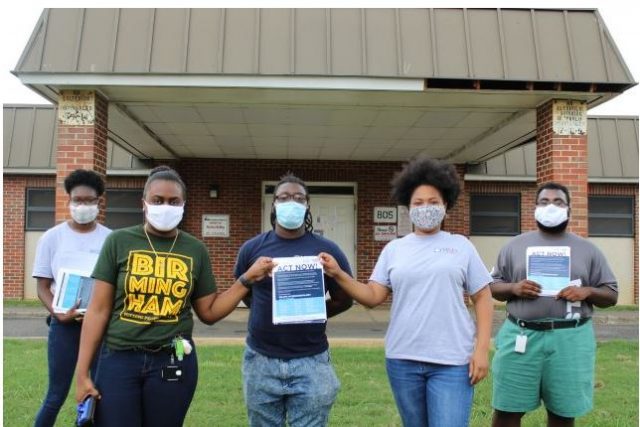
By Sydney Melson
The Birmingham Times
With the 2020 census count coming to an end on September 30 and concerned that residents are being undercounted residents, City of Birmingham workers are hitting the ground to make sure everyone counts.
Last week, Uche Bean, administrator of the city’s Office of Social Justice and Racial Equity, led a group of city employees and volunteers through Smithfield Court neighborhood in efforts to get as many to fill out the census as possible.
Wearing masks and stepping away the door before residents answered while practicing social distancing, workers canvassed door-to-door also in the Collegeville Center housing community and Elyton Village and will continue through mid-September, Bean said.
The Census Bureau moved the deadline back by one month, meaning census workers have less time to ensure that undercounted residents are included over the next five weeks.
The census provides cities with federal funding, and that funding is used for important public needs, such as free or reduced lunch programs in schools or Meals on Wheels. The census also determines seats in the House of Representatives for each state.

Bean said she and the city feel passionate about helping marginalized people including the LGBTQ, Black, homeless communities and those below the poverty line. “This is going to impact them so much,” she said. “If we don’t take a stand and bring awareness, then those that are already marginalized are going to be impacted in the worst way.”
Site visits and talking to citizens in-person while maintaining social distancing are beneficial because it helps to dispel misconceptions surrounding the census, said city officials. “We’re facing challenges as far as getting people to complete it. Historically there’s been a distrust of the government and not understanding exactly what the purpose is of trying to see how many people are in cities, and why people need to complete it,” Bean said.
Recent concerns this year include one of citizenship, she added. “People are still concerned about completing it from fear of being detained or having Immigration and Customs Enforcement (ICE) come in their home,” said Bean. Also, in the digital age, people are more concerned about their privacy.
Meeting people one-on-one enables workers to talk with citizens in a way that people can relate. “Someone who’s civically engaged, I can easily say to them: ‘if you don’t complete your census, then we stand to lose a congressional seat’,” she said.
For those who don’t care as much about politics, Bean said she has to change her strategy. “If we don’t get that federal funding, head start programs cannot be funded. Title IX funding [allows the city to] put money into public housing communities, schools and businesses coming into the city,” she said. “We’re talking 10 minutes of time for 10 years of impact.”
In 2010, Birmingham’s census count made the city the largest in the state at 212,000 people. One of the big concerns for Birmingham is to stay at the top. Higher population means more business and city growth, Bean said, so maintaining that status is a priority.
“We have to consider that if we don’t complete this, this could impact our day-to-day lives for the next 10 years,” Bean said.
For more on the census visit here.




